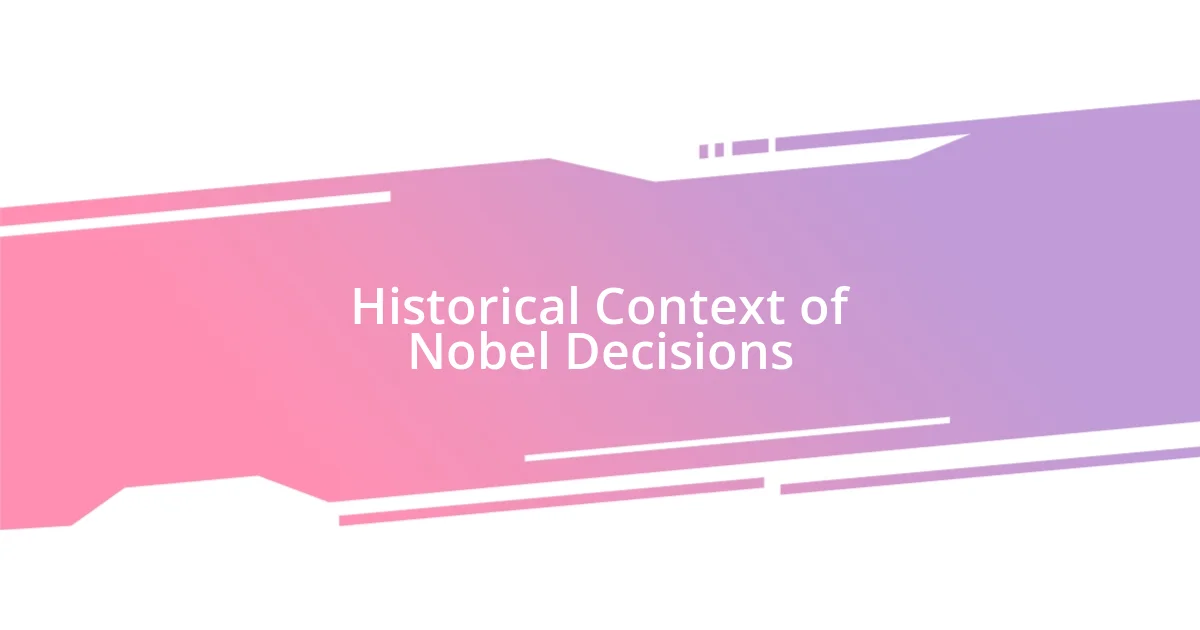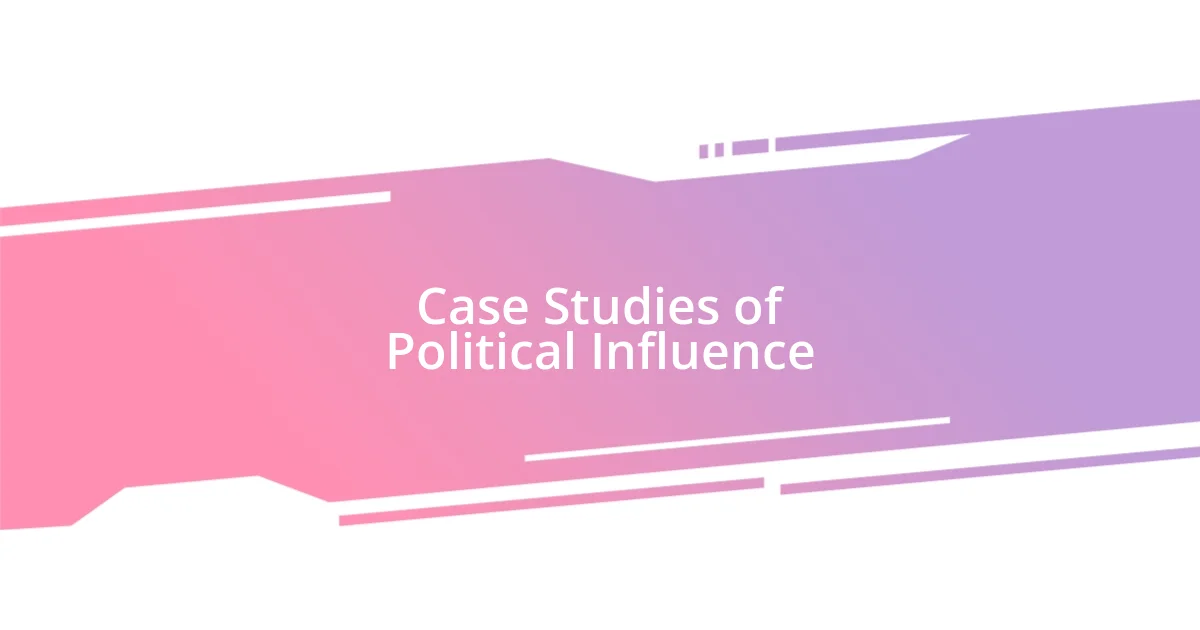Key takeaways:
- The Nobel Peace Prize has often been influenced by political contexts, leading to awards that serve as political statements rather than pure recognitions of merit, such as the prizes awarded to Liu Xiaobo and Malala Yousafzai.
- Controversial decisions, like the 1973 Peace Prize given to Le Duc Tho, who declined it, highlight the complex interplay between global politics and Nobel selections, sparking debates about the committee’s judgment.
- The Nobel Prize’s historical awards, such as those to Aleksandr Solzhenitsyn and Aung San Suu Kyi, illustrate how the committee’s choices can reflect or challenge societal values, raising questions about the implications of their selections in shifting political landscapes.

Understanding Nobel Award Influence
The Nobel Award, while prestigious, often feels swayed by political contexts. I remember feeling a mix of awe and skepticism when the Peace Prize went to figures like Barack Obama. It made me wonder—could the selection sometimes operate more as political maneuvering than a straightforward recognition of merit?
In my experience, the influence of political dynamics can overshadow the original intent of the Nobel committees. For instance, when the committee awarded the Literature Prize to Bob Dylan, it sparked debates about what really constitutes literature. Was it a heartfelt tribute to music’s social impact, or a strategic nod to countercultural movements? These questions linger, reminding me that the decision-making process is complex and rarely black and white.
Political influence also raises the importance of evaluating the nominees through a critical lens. I often find myself reflecting on how many deserving candidates may never receive recognition because their work doesn’t align with prevailing political narratives. It’s a bittersweet reminder that, while the accolade brings global attention, it can also reflect the zeitgeist of its time, for better or worse. What do you think—should the Nobel Prize lean more into cultural impact than political relevancy?

Historical Context of Nobel Decisions
The history of the Nobel decisions reveals a fascinating interplay between achievement and the tumultuous political landscapes of their times. I recall reading about how, in the early years, the prizes were awarded amidst intense nationalism and conflict. For example, the decision to award the Peace Prize to the likes of Henry Dunant in 1901 wasn’t merely recognition of humanitarian work; it was also a reflection of the urgent need for peace during a time of great upheaval in Europe.
As time progressed, I’ve noticed a notable shift in how political climates influence nominations and awards. Take the case of the Literature Prize awarded to Aleksandr Solzhenitsyn in 1970 during the Cold War—this felt like a bold statement against Soviet oppression. It’s intriguing to think about how the committee’s choices could resonate far beyond literary circles, igniting discussions and protests across the globe. My fascination with this era makes me wonder whether the committee intentionally embraced such political implications or if these were simply by-products of their decisions.
In my observations, the Nobel Prize often serves as a reflection of societal values and struggles. When the committee awarded the Peace Prize to Malala Yousafzai in 2014, I felt an immense sense of hope. It was not just recognition for her incredible bravery but also a response to global conversations about female empowerment and education. This highlighted how historical context shapes each award and can often amplify voices that challenge injustice in powerful ways.
| Year | Recipient |
|---|---|
| 1901 | Henry Dunant |
| 1970 | Aleksandr Solzhenitsyn |
| 2014 | Malala Yousafzai |

Political Bias in Nobel Selection
The notion of political bias in Nobel selection isn’t just an abstract idea; it’s something I’ve pondered over countless times, especially when thinking about the glaring choices made throughout history. For instance, the awarding of the Peace Prize to Liu Xiaobo in 2010 felt like a defiant statement against the Chinese government, bringing an emotional weight that resonated with many who supported his vision of freedom. It underscores how the political climate can deliberately enter the fray, transforming the ceremony into a platform for global political commentary rather than a mere accolade of individual achievement.
- Political affiliations of nominees can heavily influence selections.
- Awards may reflect geopolitical tensions more than personal accomplishments.
- Some winners are viewed as political symbols rather than representatives of their fields.
- Notable omissions often raise eyebrows regarding the committee’s political agendas.
It’s worth noting that awards can become part of larger political narratives. Consider how the decision to award the Literature Prize to Toni Morrison in 1993 sparked conversations about race and identity in America. It excited me to see the Nobel committee acknowledge a voice that had always been there but often overshadowed. Picking candidates like Morrison feels like a nod to the importance of reflecting diverse experiences that resonate with contemporary societal issues. This interplay between literature and politics strikes me as both complicated and necessary, revealing the profound impact of political contexts on Nobel choices.

Notable Controversies in Nobel Awards
One significant controversy surrounding the Nobel Prizes arose in 1973 when the Peace Prize was awarded to Le Duc Tho, who declined to accept it. I vividly remember the discussions that followed; many saw it as a political statement, given the ongoing Vietnam War. It’s fascinating to think about how the decision affected perceptions of both the committee and the prize itself. Did the committee misjudge the climate, or was it a deliberate act of defiance?
Another contentious moment took place in 1994 when Yasser Arafat, Shimon Peres, and Yitzhak Rabin received the Peace Prize for their efforts in the Oslo Accords. I recall feeling a mix of hope and skepticism; while the award highlighted a pivotal moment in peace negotiations, it also raised questions about whether it was too soon to celebrate. Did bestowing the prize to contentious figures risk overshadowing genuine grassroots peace efforts? I often wonder if the committee could foresee how complex and fraught those relationships would remain.
In 2016, the decision to give the Peace Prize to Juan Manuel Santos for ending Colombia’s civil war ignited discussions about the legitimacy of the award. Personally, it felt both optimistic and troubling; the peace process was still fragile, and many doubted if it would hold. It makes me think about the responsibility that comes with such an influential accolade. Are the committee members prepared to navigate the potential fallout when real-world political landscapes are still shifting? Those questions linger long after the glittering ceremony fades from view.

Case Studies of Political Influence
I think it’s telling how often nominees’ political backgrounds play a role in their selection. For instance, when the Nobel Committee awarded the Peace Prize to Aung San Suu Kyi in 1991, it felt like they were rallying behind a symbol of hope against oppressive regimes. I remember discussing this with friends and wondering how the world would respond if her political views changed. That’s the heart of the matter; selections can feel like affirmations or challenges to current political narratives, making us question the true motivations behind the honors.
A striking example is the 1970 Nobel Prize for Literature awarded to Aleksandr Solzhenitsyn. At that time, the West had a complex relationship with the Soviet Union, and giving this award to a staunch critic seemed like a bold political statement. I can’t help but recall the conversations it sparked—were we celebrating literature, or were we intentionally taking a political stance? The intersection of art and politics in such decisions intrigues me, emphasizing how deeply intertwined cultural achievements are with geopolitical issues.
Exploring omissions, the lack of a Nobel Prize for notable activists, like Nelson Mandela during his fight against apartheid, raises fascinating questions. Reflecting on that omission, I often find myself asking, did the committee fear backlash from the South African government, or was it a matter of timing? Sometimes it feels like the committee has to tread carefully, balancing their values against the backdrop of global politics, which can distort the intent behind this prestigious award.














